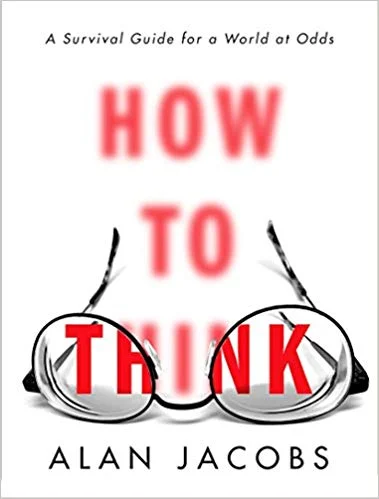Executive Bookshelf : How to Think: A Survival Guide for a World at Odds - Alan Jacobs
Synopsis
How to Think is a contrarian treatise on why we’re not as good at thinking as we assume—but how recovering this lost art can rescue our inner lives from the chaos of modern life.
As a celebrated cultural critic and a writer for national publications like The Atlantic and Harper’s, Alan Jacobs has spent his adult life belonging to communities that often clash in America’s culture wars. And in his years of confronting the big issues that divide us—political, social, religious—Jacobs has learned that many of our fiercest disputes occur not because we’re doomed to be divided, but because the people involved simply aren’t thinking.
Most of us don’t want to think. Thinking is trouble. Thinking can force us out of familiar, comforting habits, and it can complicate our relationships with like-minded friends. Finally, thinking is slow, and that’s a problem when our habits of consuming information (mostly online) leave us lost in the spin cycle of social media, partisan bickering, and confirmation bias.
In this smart, endlessly entertaining book, Jacobs diagnoses the many forces that act on us to prevent thinking—forces that have only worsened in the age of Twitter, “alternative facts,” and information overload—and he also dispels the many myths we hold about what it means to think well. (For example: It’s impossible to “think for yourself.”)
Drawing on sources as far-flung as novelist Marilynne Robinson, basketball legend Wilt Chamberlain, British philosopher John Stuart Mill, and Christian theologian C.S. Lewis, Jacobs digs into the nuts and bolts of the cognitive process, offering hope that each of us can reclaim our mental lives from the impediments that plague us all. Because if we can learn to think together, maybe we can learn to live together, too.
Tom’s Take
One of the great things about reading and maintaining a healthy reading appetite is that it allows me to take random strolls down new literary paths. One of those strolls has been in the world of psychology; understanding how we think and why we think the way we do.
During one of my recent random strolls in the world of psychology, I found a great read that I highly recommend. How To Think by far has been one of the best books to give amateur psychologists a look into our minds.
The general premise is that although we all have these complex things call brains, we don't know how to think. Thinking is a difficult endeavor - and therefore thinking about thinking is even more diffuclt.
The inspired take away is that we can control the way we think about thinking and make changes in our behavior to become better, more clear thinkers. We can free ourselves from pre-judged "truths" and the problems that arise from a world that thinks in bytes well as bites.
If you are on the fence about taking a plunge into this book here are a few highlights on how to become a better thinker.:
When faced with provocation to respond to what someone has said, give it 5 minutes and move - get your body involved and out of your head.
Value learning over debating.
You don't have to respond to what everyone else is responding to.
Gravitate as best you can, in every way you can, toward people who seem to value genuine communication. Learn from those that can handle disagreement with equanimity.
Seek out the best and fairest-minded people whose views you disagree with. Listen to them for a time without responding. Whatever they say, think it over.
Patiently and as honestly as you can, assess your repugnancies.
Try to describe others' positions in the language that they use, without indulging in other-wording.
Be Brave. This isn’t easy work.
Go forth and think. Think wisely. Remember that the mass of matter between your ears is incredibly powerful - so train it and yourself to be the best thinker possible.


